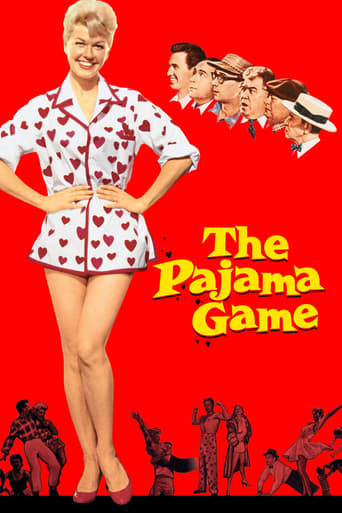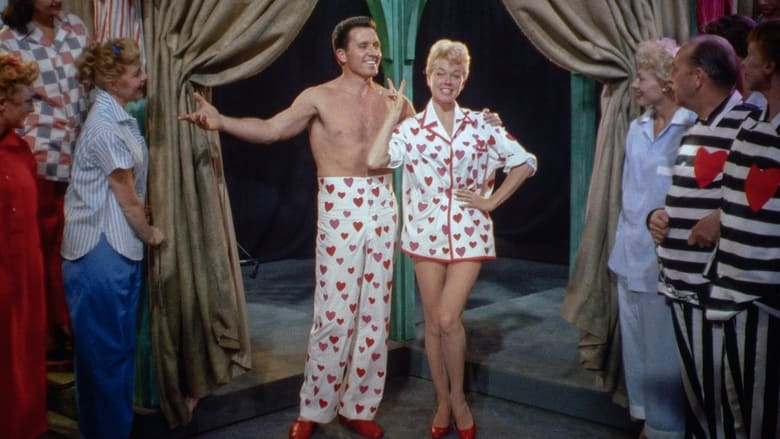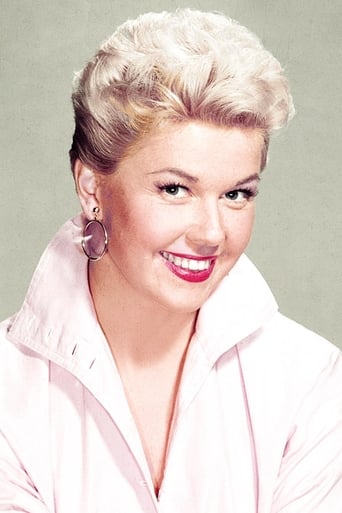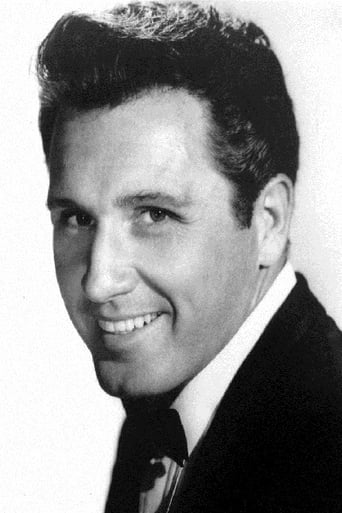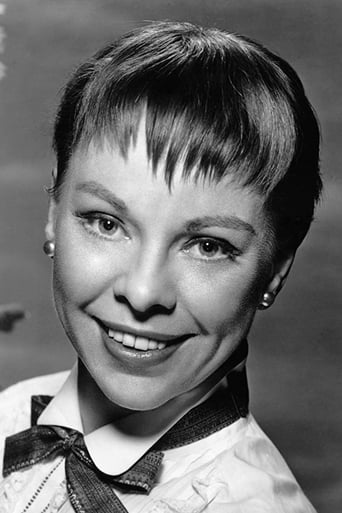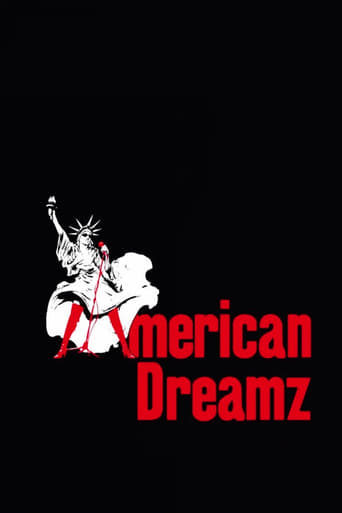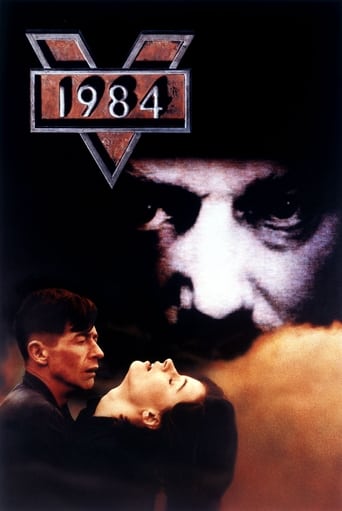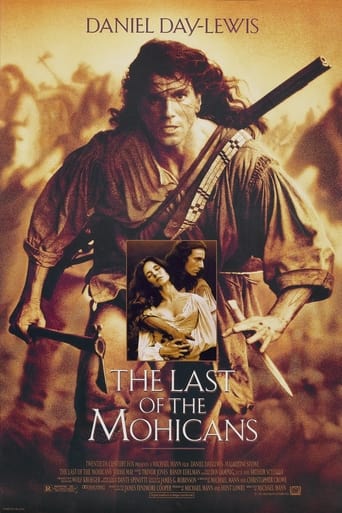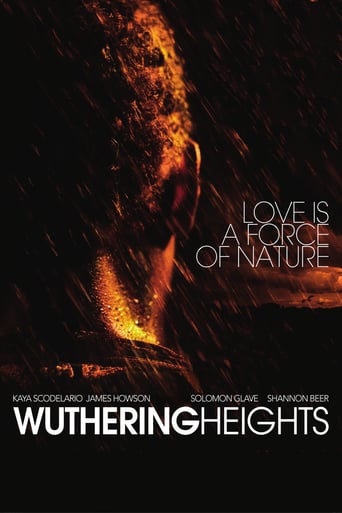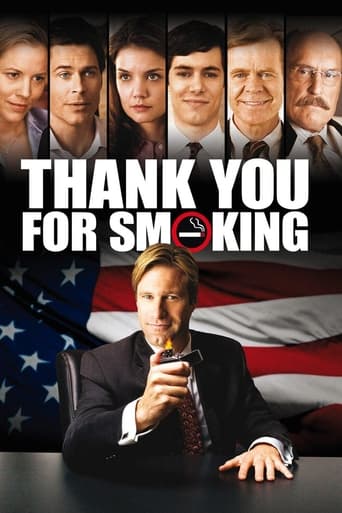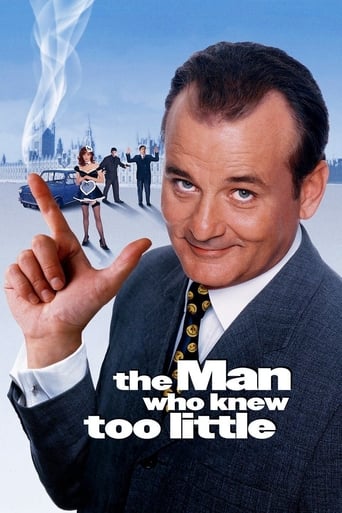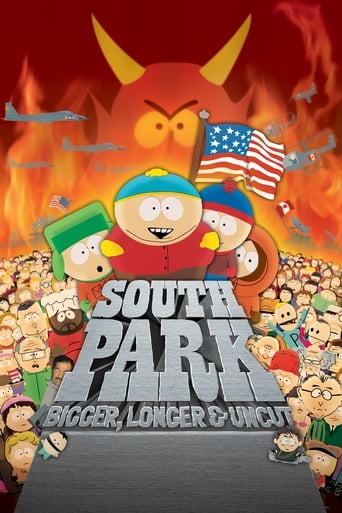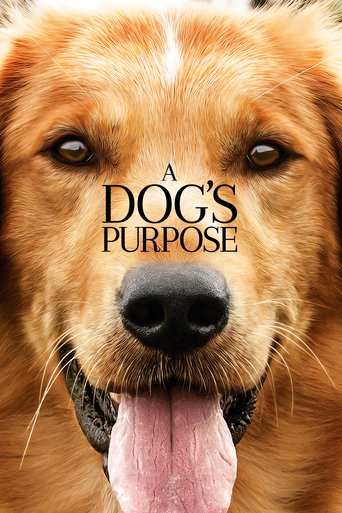The Pajama Game (1957)
An Iowa pajama factory worker falls in love with an affable superintendent who had been hired by the factory's boss to help oppose the workers' demand for a pay raise.
Watch Trailer
Cast
Similar titles

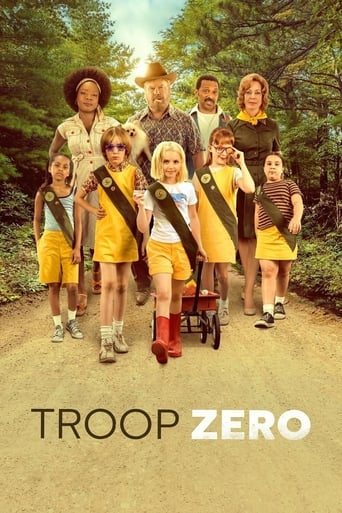
Reviews
This story has more twists and turns than a second-rate soap opera.
It's an amazing and heartbreaking story.
This is a small, humorous movie in some ways, but it has a huge heart. What a nice experience.
The film's masterful storytelling did its job. The message was clear. No need to overdo.
When I watched this film, I was VERY surprised to see the subplot involving the jealous boyfriend (Eddie Foy Jr.) Such extreme jealousy is NOT funny--though it was sure meant to be. And late in the film when he chased his girl with a knife--tossing them right and left at her...funny?! It's pretty amazing that insane pathological violence was seen as a laugh-getter back in the day! As for the plot of "The Pajama Game", it plays a LOT like a musical-comedy version of "Norma Rae"! Seriously....it really is very similar. Doris Day plays a spunky union rep who is pushing her company for a 7 1/2 cent an hour raise--and the pig-headed boss is willing to let the business go to pot for 7 1/2 cents. Stuck in the middle is John Raitt--who represents the company BUT who is also infatuated with Day. What's to happen? See the film.This is a decent musical overall but not much more. Some of the songs are very familiar and quite good, while some seem inexplicable, as they seem to have nothing to do with the plot and just seemed crammed in regardless (such as "Steam Heat" and "Hernando's Hideaway"). Also, when it comes to Day's singing, you might find (like I did) that it came off as brash--as she belted out tune after tune with little grace--just LOTS of power. In fact, though he never went on to star in another film, Raitt came off pretty well in this one and you wonder why he didn't get more opportunities in films--though apparently his career on stage was quite long and successful.
One of the most popular musicals of the early 1950s received a reasonable film adaptation here courtesy of Stanley Donen and Broadway legend George Abbott. For me, the main object of interest here is the presence of original cast members John Raitt and Carol Haney in the film. They are two performers who were popular on Broadway but were often replaced for film versions of their hits. John Raitt was said to be "un-photogenic" but he had an incredible singing voice and personally I found him suitably attractive and at the same time very down to earth. Carol Haney was a big discovery for me here because previously I've only heard about her dancing, but here in "Steam Heat" we get to see just how really special she was. She and Bob Fosse collaborated here obviously, and the result is truly fresh and inventive. I also like how she plays her character, a very good drunk scene included.Doris Day, what can you say? Sometimes I like her, as in "Calamity Jane", but for some reason I just couldn't enjoy her in this role. Part of the problem, for her and Raitt both, was how quickly they're supposed to be professing love for each other. After the great build-up with all the workplace tension, it's hard to accept. I was dreading through the whole film hearing her sing "Hernando's Hideaway" and I was so pleased to find out that it was one of Haney's numbers. Very well staged by the way, a very good version of that song.This has never been one of my favorite shows to listen to, but I always wanted to at least see the film version so I could know the story. Other than "Hey There" and "Hernando's Hideaway" none of the songs have really appealed to me, and some like "Once a Year Day" and "Not at all in Love" are kind of awful in their cloying way. I suppose you could say that style matches Day very well, but it's the mode I don't like seeing Day in. However Raitt, Haney, and Eddie Foy Jr. do come together and give the movie quite a bit of class.
The Pajama Game began as a book by Richard Bissell called "7 1/2 cents". It was the turned into an innovative and hugely successful Broadway musical as "The Pajama Game" by George Abbot and author Bissell, with choreography by Jerome Robbins and Bob Fosse, and words and music by Richard Adler and Jerry Ross. Most of the cast utilized in this film of the famous musical, for once, are talents from the Broadway play, with Doris Day as "Babe" Williams joining John Raitt as Sid Sorokin the ill-matched labor and management couple about whom the story centers. The storyline I find to be a very straightforward and appealing narrative. An Iowa pajama factory's chief is having a dispute with his workforce over a demand for a badly-needed 7 1/2 cents-an- hour pay increase that all his competitors have granted already. The new superintendent falls in love with one of the Grievance Committee's members, despite her hesitation because he is management and she labor. When, after the liberating annual company picnic, the demands are again refused, Day stops the machinery after a slowdown is stopped by Raitt, and he has to fire her. The aftermath is that sabotage by the workers is slowly wrecking sales. When the boss still stubbornly refuses to give in, Raitt invites his secretary (Carol Haney) our for a drink and she all-but-gives him the key she wears around her neck that unlocks the Boss's books; after her insanely jealous boyfriend (Eddie Foy Jr.) has been dealt with, Raitt appears at the workers' meeting after forcing the boss (Ralph Dunn) to "compromise"--he will grant the raise immediately if the retroactive pay the workers should have had all along is ignored--the pay he'd been pretending could not be paid. As the lead, John Raitt is energetic, sings in a fine Irish tenor and handles every aspect of his assignment very well. Doris Day is quite believable as Babe Williams but lacks a Broadway caliber voice. Carol Haney makes a fine comedy debut as the secretary. Eddie Foy plays Hinesie Heinz, her boy friend, a caricature of a role, with vaudevillian grace and intelligence. His number with Reta Shaw as Raitt's assistant "I Would Trust Her" is a highlight for many, charming and unusually stylish. Others in the cast include powerful Ralph Dunn as the tough boss, Thelma Pelish as Mae, accomplished Jack Straw as Prez and Ralph Chambers as Charlie. Memorable musical numbers include, "Hurry Up", "Hey There", "I'm Not at All in Love", "Steam Heat", "The Pajama Game", "Once A Year Day", "There Once Was a Man" and "Hernando's Hideaway". Among production artists, Harry Stradling's difficult cinematography achievement, seamless art direction by Malcom C. Bert, set decoration by William Kuehl and costume design by Jean Eckart and William Eckart and Frak Thomas all deserve mention. Pros such as Buddy Bregman, Nelson Riddle, Charles Henderson and Ray Heidorf contributed to the vocal and musical success the film achieves. The characters may be presented a bit surrealistically, but this is actually a ground-breaking Warner Brothers attempt, like "the Fountainhead", whose target is the totalitarian "bossism" that was even then destroying American values and requiring real leaders to stand up for individuals' rights against unrealistic gatekeeper 'tsars'. This is a very-well -realized musical about people fighting against a most corrupt system; and musically one of the best offerings ever to come out of Hollywood.
I'm not a big fan of vintage Hollywood musicals any more and can only return, even if with trepidation, to just a handful of classic titles. For that reason, I haven't watched one in ages but this film had always been a highly-touted example of the genre being also more adult than usual, with a social theme involving an impending factory strike so, I decided to give it a go. That said, my adjustment to the schmaltzy style which so characterizes musicals of this era wasn't immediate...However, there's no denying that the songs by Richard Adler and Jerry Ross are splendid even if I preferred the more intimate numbers; likewise, Bob Fosse's choreography felt impersonal for the most part (though I was, admittedly, conditioned by the fact that I'd seen the musicals he later directed which exhibited a definite, and unique, stylization to the dance steps prior to this one!). Anyway, the best musical sequences are: Doris Day's "I'm Not At All In Love", John Raitt's melancholy "Hey There" (later reprised by Day), "Steam Heat" (a recognizably Fosse number highlighting Carol Haney) and the stylish "Hernando's Hideaway" (though, in retrospect, it seemed silly to me that the latter is ostensibly a "secluded place" and yet all the factory-workers seem to hang out there!).The cast, of course, is headed by Day (ideally cast here as the head of the factory's "Grievance Committee", with the film itself generally considered as her best); many of her fellow performers had originated their characters during the show's Broadway run including leading man John Raitt (rather stolid in his only major film role), Eddie Foy Jr. (as the burly manager at the factory whose fits of jealousy and penchant for throwing knives could turn dangerous when he's had one drink too many!) and Carol Haney (as the latter's fiancé and the factory-boss' secretary in what proved to be her last film, as she died quite young).Ultimately, the film isn't up to Donen's best (and better-known) musicals such as ON THE TOWN (1949), SINGIN' IN THE RAIN (1952) and SEVEN BRIDES FOR SEVEN BROTHERS (1954) nor do I see myself watching it as frequently as his two delightful imitation-Hitchcock comedy-thrillers, namely CHARADE (1963) and ARABAESQUE (1966). Still, even if I wasn't quite as enthused with the film as I'd hoped, I'd still like to catch the same team's follow-up musical DAMN YANKEES (1958), if anything for its Faustian overtones.
